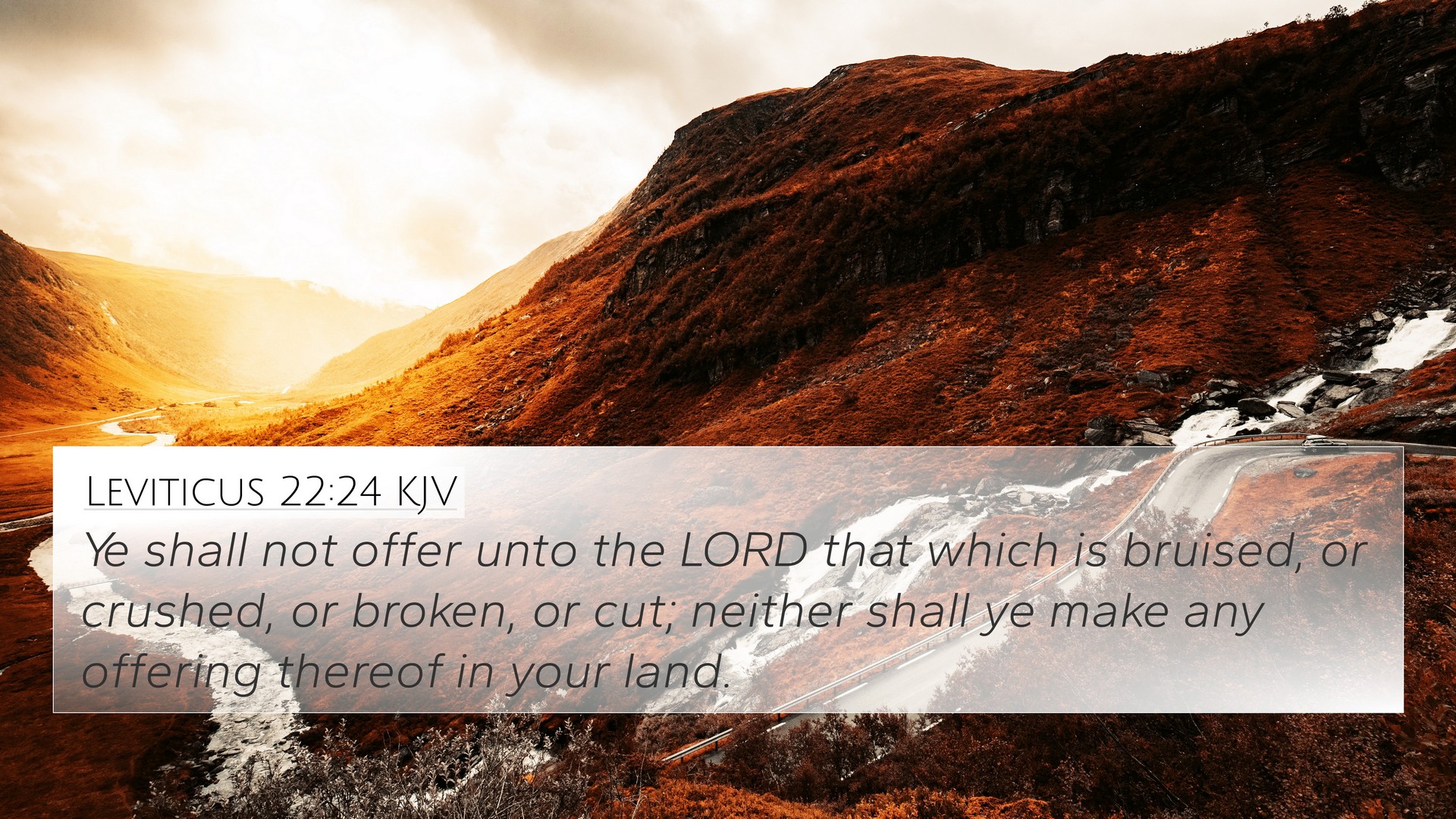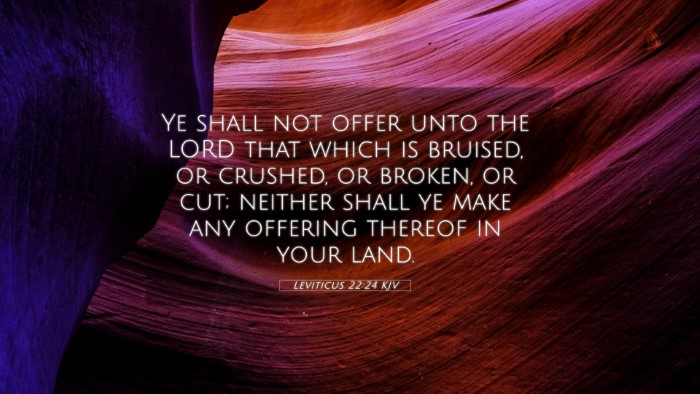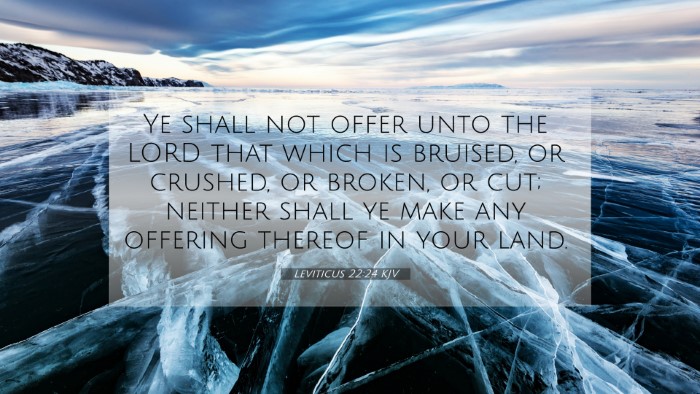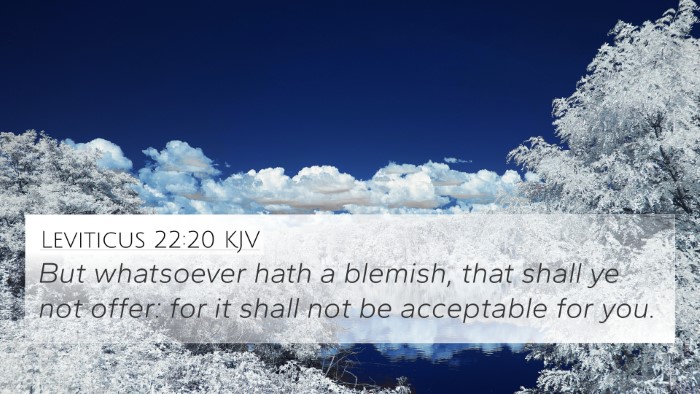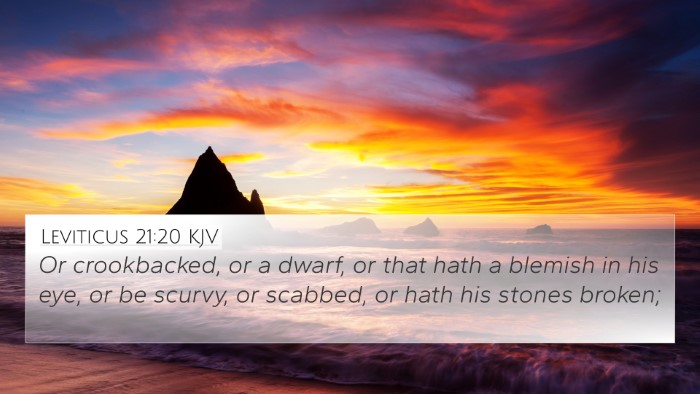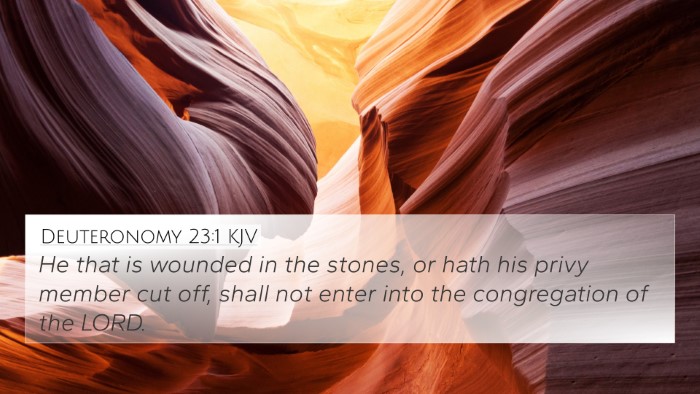Understanding Leviticus 22:24
Leviticus 22:24 states: "You shall not offer to the LORD what is bruised or crushed or torn or cut; nor shall you make any offering of them in your land." This verse is a directive concerning the types of sacrifices that can be offered to God. Below, we will explore the meanings and implications of this verse, drawing from public domain commentaries, while linking it to other relevant scriptures through thematic connections.
Commentary Insights
Matthew Henry's Commentary
Matthew Henry emphasizes that this command highlights the importance of offering to God only that which is whole and unblemished. It reflects God's holiness and the need for His people to show reverence in their worship. Sacrifices that are imperfect symbolize a lack of respect for God.
Albert Barnes' Notes on the Bible
Albert Barnes provides further clarification by stating that the stipulations regarding the quality of sacrifices underscore the principle of giving God the best of one’s resources. He connects this command to the broader context of the Levitical laws, which serve to teach the Israelites about the seriousness of sin and the need for atonement through unblemished offerings.
Adam Clarke's Commentary
Adam Clarke focuses on the practical application of this verse, noting that it not only applies to animals but can extend to the spiritual integrity of the worshiper. The principle here is about purity and integrity in one’s relationship with God, reminding believers to approach Him with sincerity and genuine worship.
Thematic Connections
This verse connects thematically with several others throughout the Bible. The idea of offering unblemished sacrifices aligns with various scriptures that emphasize the importance of holiness and purity in worship.
- Exodus 12:5: "Your lamb shall be without blemish, a male of the first year..." - This verse establishes the precedent for sacrifices that are faultless.
- Malachi 1:8: "And when you offer the blind as a sacrifice, is it not evil?" - Malachi condemns the offering of imperfect sacrifices, illustrating God's displeasure with such acts.
- Romans 12:1: "Present your bodies as a living sacrifice, holy and acceptable to God…" - This New Testament exhortation echoes the call for purity in offerings, translating it from animals to ourselves.
- Hebrews 9:14: "How much more will the blood of Christ, who through the eternal Spirit offered himself without blemish to God…" - The ultimate sacrifice of Christ fulfills the requirement for unblemished offerings.
- 1 Peter 1:19: "...but with the precious blood of Christ, as of a lamb without blemish and without spot." - This reinforces the Old Testament principles regarding sacrifices in the New Covenant context.
- James 1:27: "Pure and undefiled religion before God… is this: to visit orphans and widows in their trouble…" - True worship is linked to integrity and care for others, paralleling the theme of offering purity.
- Matthew 5:23-24: "If you bring your gift to the altar and there remember that your brother has something against you…" - This passage connects the idea of personal purity with the act of offering to God.
Inter-Biblical Dialogue
Leviticus 22:24 serves as a link between the Old and New Testaments, where the principles of offering unblemished sacrifices carry through to discussions of moral integrity. The connections between Bible verses can be examined through various tools and resources.
Tools for Bible Cross-Referencing
When studying this verse and its connections, here are some effective tools:
- Bible Concordance: A systematic way to explore key terms and verses.
- Bible Cross-Reference Guide: Useful for finding parallel verses that discuss similar themes.
- Cross-Reference Bible Study: Engaging in comparative Bible analysis can help deepen understanding.
- Bible Chain References: Following themes through a chain of connected verses offers clarity on concepts.
Conclusion
Leviticus 22:24 invites profound reflection on our approach to worship and sacrifices, urging us to dedicate what is pure and whole to God. By understanding this verse within its broader context and linking it to other scriptures, we gain a clearer comprehension of its significance and the thematic threads running throughout the Bible.
